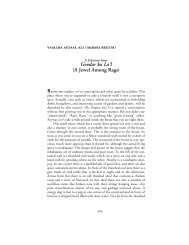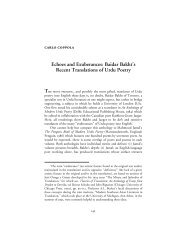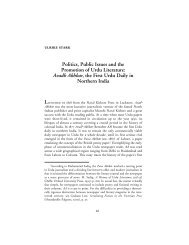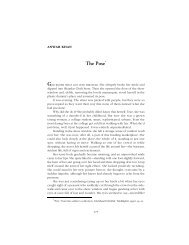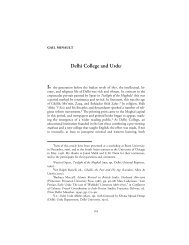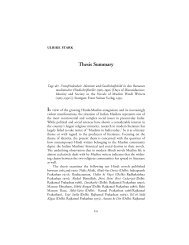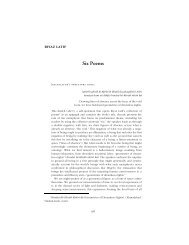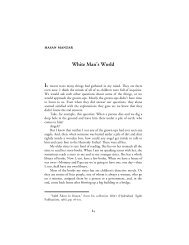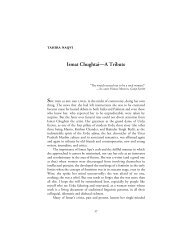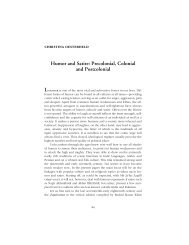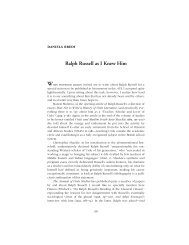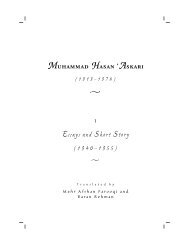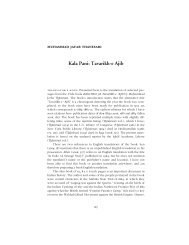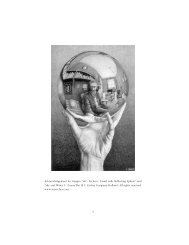Form or Mere Illusion?* - the Annual of Urdu Studies
Form or Mere Illusion?* - the Annual of Urdu Studies
Form or Mere Illusion?* - the Annual of Urdu Studies
- No tags were found...
Create successful ePaper yourself
Turn your PDF publications into a flip-book with our unique Google optimized e-Paper software.
Muhammad Hasan Askari • 15lures us to our ruin!î 8 He knew all too well that what he needed f<strong>or</strong>energy and <strong>the</strong> power to create was not ìstyleî but a new conception <strong>of</strong>life, a new standard <strong>of</strong> m<strong>or</strong>ality. Waiting f<strong>or</strong> a subject <strong>of</strong> his own likingmeant only searching f<strong>or</strong> a new <strong>or</strong>der <strong>of</strong> values. He had witnessed <strong>the</strong>f<strong>or</strong>ce with which life erupts into being in his The Temptation <strong>of</strong> SaintAnthony and found it exhilarating f<strong>or</strong> both body and soul, but how migh<strong>the</strong> accept <strong>the</strong> path life had already taken and how might he be in acc<strong>or</strong>dwith it? Flaubert searched f<strong>or</strong> this ìhow?î all his life long and never didfind it. Although he saw a glimpse <strong>of</strong> this ìacc<strong>or</strong>dî in A Simple Soul, itfailed to satisfy him permanently. He continued to search f<strong>or</strong> a newmeaning, though he did not dareóin view <strong>of</strong> <strong>the</strong> reasons I have given at<strong>the</strong> beginning <strong>of</strong> this essayóto admit it. What he was looking f<strong>or</strong> was aìnew m<strong>or</strong>ality,î what he kept telling himself he needed was ìart.î Thisone sh<strong>or</strong>tcoming was <strong>the</strong> root-cause <strong>of</strong> all his spiritual t<strong>or</strong>ment.This m<strong>or</strong>e <strong>or</strong> less holds f<strong>or</strong> o<strong>the</strong>r artists too. They are looking f<strong>or</strong>ìmeaningî in <strong>the</strong> guise <strong>of</strong> ìf<strong>or</strong>m.î Life in <strong>the</strong> industrial age has nei<strong>the</strong>r facen<strong>or</strong> f<strong>or</strong>m, and <strong>the</strong> <strong>or</strong>ganic connecting tissue between <strong>the</strong> parts and <strong>the</strong>whole has snapped. Life and what it depends on no longer have an identifiablepurpose. Consequently, <strong>the</strong> meaning is gradually fading away. Solong as life had purpose, meaning, harmony and f<strong>or</strong>m, artists did not haveto strive consciously f<strong>or</strong> <strong>the</strong>m. Today when <strong>the</strong>se qualities have disappearedand <strong>the</strong> artist lacks <strong>the</strong> courage to rest<strong>or</strong>e <strong>the</strong>m to society, he inevitablyturns toward ìartî in <strong>the</strong> hope <strong>of</strong> finding a substitute. Since <strong>the</strong>sense <strong>of</strong> harmony lacking in real life becomes possible in a w<strong>or</strong>k <strong>of</strong> art, heassumes that such a w<strong>or</strong>k is an entity apart from life and he is loath toapply lifeís values to it. Since <strong>the</strong> milieu fails to provide life with a standard<strong>of</strong> values and an established <strong>or</strong>der, he demands <strong>the</strong> principles <strong>of</strong>artistic creation and <strong>the</strong> <strong>or</strong>der <strong>of</strong> its elements from aes<strong>the</strong>tics. F<strong>or</strong> instance,an already established structure was available to earlier novelists. A manfalls in love with a woman, difficulties arise, finally <strong>the</strong>se are resolved,<strong>the</strong>y get married, and live toge<strong>the</strong>r happily ever after. Today no suchstructure <strong>of</strong> life is available. Every life assumes a new f<strong>or</strong>m <strong>or</strong> remainsf<strong>or</strong>mless like many o<strong>the</strong>r lives. Bef<strong>or</strong>e, as soon as <strong>the</strong> novel ended ourinterest in its protagonist waned. We assumed that nothing imp<strong>or</strong>tant waslikely to happen later. The protagonist would live <strong>the</strong> rest <strong>of</strong> his life likeo<strong>the</strong>r people. At <strong>the</strong> end <strong>of</strong> modern sh<strong>or</strong>t st<strong>or</strong>ies and novels, however, <strong>the</strong>protagonist discovers a completely new direction and sets <strong>of</strong>f, and even ifthat is not <strong>the</strong> case, he finds that his life has no fixed point <strong>of</strong> arrival, it is8 The <strong>or</strong>iginal French reads: ìO líart, líart, déception amère, fantôme sansnom qui brille et qui vous perd...î (letter to Ernest Chevalier (26 Dec. 1838)), inOeuvres Complètes, 5 vols. ((Paris: Conard, 1910), vol. 1, p. 39). I am grateful to AnisMemon who located <strong>the</strong> quote and also translated it.



